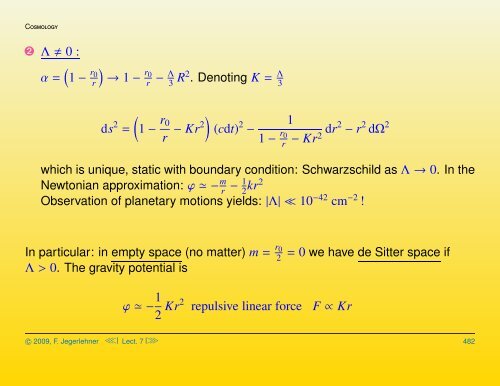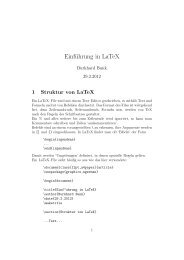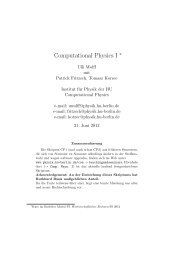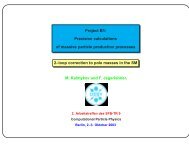- Page 1 and 2:
Cosmology Cosmological solutions of
- Page 3 and 4:
Cosmology Cosmological solutions of
- Page 5 and 6:
Cosmology claimed to represent the
- Page 7 and 8:
Cosmology claimed to represent the
- Page 9 and 10:
Cosmology claimed to represent the
- Page 11 and 12:
Cosmology A) Empty Worlds, vacuum e
- Page 13 and 14:
Cosmology A) Empty Worlds, vacuum e
- Page 15 and 16:
Cosmology The general solution is S
- Page 17 and 18:
Cosmology The general solution is S
- Page 19 and 20:
Cosmology The general solution is S
- Page 21 and 22:
Cosmology (d) Λ > 0 , k = 0: S = e
- Page 23 and 24:
Cosmology (d) Λ > 0 , k = 0: S = e
- Page 25 and 26:
Cosmology (d) Λ > 0 , k = 0: S = e
- Page 27 and 28:
Cosmology Terminology: Λ > 0 , k =
- Page 29 and 30:
Cosmology Terminology: Λ > 0 , k =
- Page 31 and 32:
Cosmology Terminology: Λ > 0 , k =
- Page 33 and 34:
Cosmology B) Matter dominated: ρ >
- Page 35 and 36:
Cosmology B) Matter dominated: ρ >
- Page 37 and 38:
Cosmology ct = C arcsin √ X −
- Page 39 and 40:
Cosmology ct = C arcsin √ X −
- Page 41 and 42:
Cosmology ct = C arcsin √ X −
- Page 43 and 44:
Cosmology In each case we have S (t
- Page 45 and 46:
Cosmology In each case we have S (t
- Page 47 and 48:
Cosmology In each case we have S (t
- Page 49 and 50:
Cosmology Einstein-de Sitter univer
- Page 51 and 52:
Cosmology Einstein-de Sitter univer
- Page 53 and 54:
Cosmology t = 2 3 H−1 (t) (EdS) H
- Page 55 and 56:
Cosmology t = 2 3 H−1 (t) (EdS) H
- Page 57 and 58:
Cosmology Back to the non-flat geom
- Page 59 and 60:
Cosmology Back to the non-flat geom
- Page 61 and 62:
Cosmology in terms of the observabl
- Page 63 and 64:
Cosmology in terms of the observabl
- Page 65 and 66:
Cosmology in terms of the observabl
- Page 67 and 68:
Cosmology in terms of the observabl
- Page 69 and 70:
Cosmology The conclusion of the abo
- Page 71 and 72:
Cosmology The conclusion of the abo
- Page 73 and 74:
Cosmology The conclusion of the abo
- Page 75 and 76:
Cosmology C) Radiation dominated: p
- Page 77 and 78:
Cosmology C) Radiation dominated: p
- Page 79 and 80:
Cosmology C) Radiation dominated: p
- Page 81 and 82:
Cosmology ❖ k = 0 : S (t) = 4 ¯
- Page 83 and 84:
Cosmology In each case we have S (t
- Page 85 and 86:
Cosmology In each case we have S (t
- Page 87 and 88:
Cosmology In each case we have S (t
- Page 89 and 90:
Cosmology κ ρ(t) = 3 H2 (t) K(t)
- Page 91 and 92:
Cosmology Actually, in the radiatio
- Page 93 and 94:
Cosmology Actually, in the radiatio
- Page 95 and 96:
Cosmology 8π hν ργ(ν) dν = 3
- Page 97 and 98:
Cosmology 8π hν ργ(ν) dν = 3
- Page 99 and 100:
Cosmology Since ρ(t)S (t) 4 = ρ0S
- Page 101 and 102:
Cosmology c○ 2009, F. Jegerlehner
- Page 103 and 104:
Cosmology and Dicke and Peebles at
- Page 105 and 106:
Cosmology T0 = (2.725 ± 0.002) ◦
- Page 107 and 108: Cosmology T0 = (2.725 ± 0.002) ◦
- Page 109 and 110: Cosmology However, the evolution of
- Page 111 and 112: Cosmology However, the evolution of
- Page 113 and 114: Cosmology ρ(t) Big Bang radiation
- Page 115 and 116: Cosmology The critical energy densi
- Page 117 and 118: Cosmology The critical energy densi
- Page 119 and 120: Cosmology The critical energy densi
- Page 121 and 122: Cosmology Ω0 = 1 c○ 2009, F. Je
- Page 123 and 124: Cosmology Ω0 = 1 is the critical
- Page 125 and 126: Cosmology Ω0 = 1 is the critical
- Page 127 and 128: Cosmology Ω0 = 1 is the critical
- Page 129 and 130: Cosmology ˙S 2 c 2 + k = κ 3 ρ S
- Page 131 and 132: Cosmology ˙S 2 c 2 + k = κ 3 ρ S
- Page 133 and 134: Cosmology q0 = κ (ρ0+3 p0) 6 H 2
- Page 135 and 136: Cosmology Form of energy equation o
- Page 137 and 138: Cosmology Form of energy equation o
- Page 139 and 140: Cosmology Form of energy equation o
- Page 141 and 142: Cosmology in which case, independen
- Page 143 and 144: Cosmology in which case, independen
- Page 145 and 146: Cosmology in which case, independen
- Page 147 and 148: Cosmology (in accord with the unive
- Page 149 and 150: Cosmology (in accord with the unive
- Page 151 and 152: Cosmology missing part making Ω =
- Page 153 and 154: Cosmology missing part making Ω =
- Page 155 and 156: Cosmology Appendix: Λ 0 The issue
- Page 157: Cosmology physical effect of a non-
- Page 161 and 162: Cosmology and the metric ds 2 = 1
- Page 163 and 164: Cosmology With a 2 1 K = 3 Λ ; a
- Page 165 and 166: Cosmology With a 2 1 K = 3 Λ ; a
- Page 167 and 168: Cosmology Λ < 0: Anti-de Sitter sp
- Page 169 and 170: Cosmology Λ < 0: Anti-de Sitter sp
- Page 171 and 172: Cosmology Note: z = constant is the






![Preprint[pdf] - HU Berlin](https://img.yumpu.com/3833433/1/190x245/preprintpdf-hu-berlin.jpg?quality=85)
